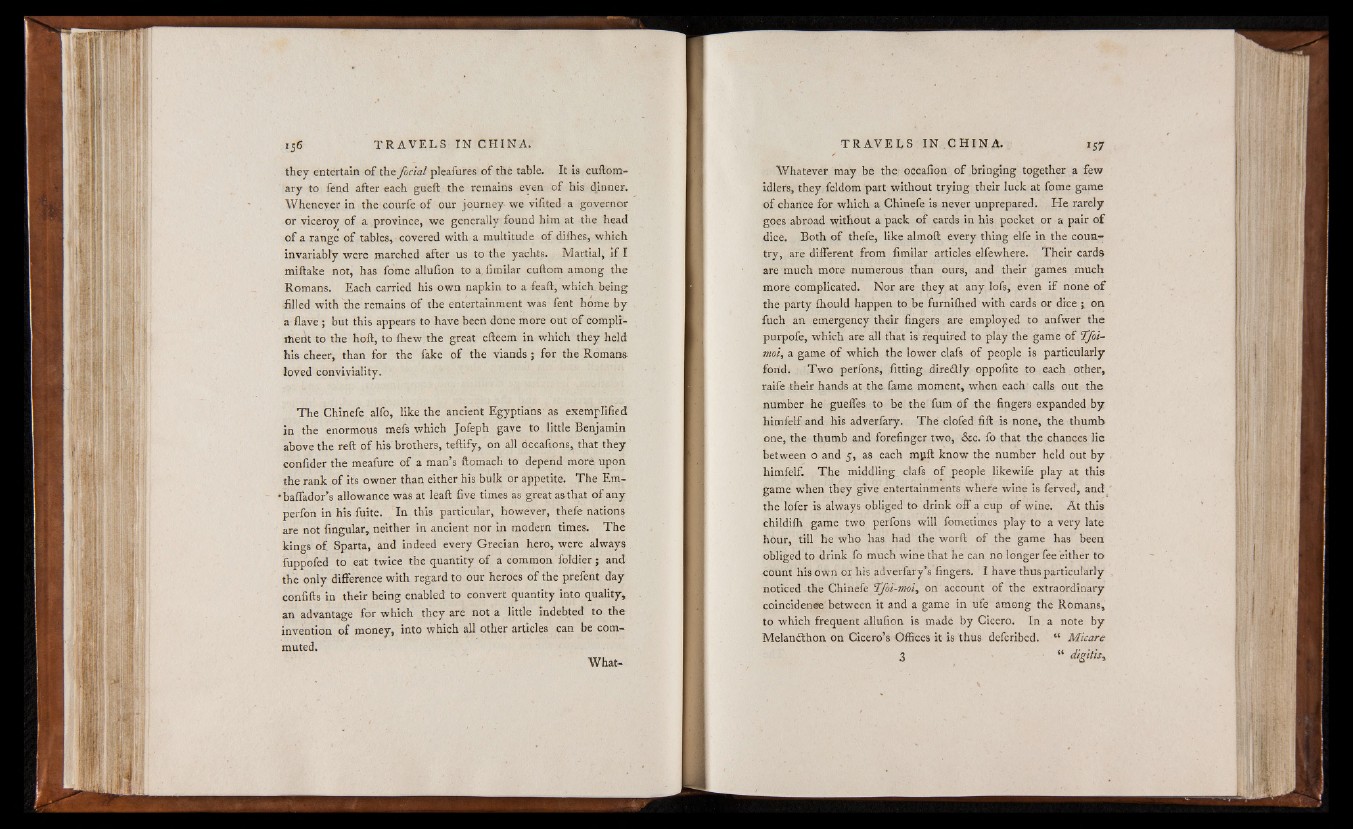
they entertain o f the facia l pleafures o f the table. It is cuftom-
ary to fend after each gueft the remains even o f his dinner.
Whenever in the courfe o f our journey- we vifited a governor
or viceroy o f a province, we generally found him at the head
o f a range o f tables, covered with a multitude o f difhes, which
invariably were marched after us to the yachts. Martial, i f I
miftake not, has fome allufion to a, fimilar cuftom among the
Romans. Each carried his own napkin to a feaft, which being
-filled with the remains o f the entertainment was fent home by
a Have ; but this appears to have been done more out o f compli-
ltierit to the hoft, to fhew the great efteem in which they held
his cheer, than for the fake o f the viands; for the Romans
loved conviviality.
The Chinefe alfo, like the ancient Egyptians as exemplified
in the enormous mefs which Jofeph gave to little Benjamin
above the reft o f his brothers, teftify, on all occafions, that they
confider the meafure o f a man’ s ftomach to depend more upon
the rank o f its owner than either his bulk or appetite. The Em-
•baffador’s allowance was at leaft five times as great asthat o f any
perfon in his fuite. In this particular, however, thefe nations
are not Angular, neither in ancient nor in modern times. T he
kings o f Sparta, and indeed every Grecian hero, were always
fuppofed to eat twice the quantity o f a common foldier ; and
the only difference with regard to our heroes o f the prefent day
confifts in their being enabled to convert quantity into quality,
an advantage for which they are not a little indebted to the
invention o f money, into which all other articles can be commuted.
What-
Whatever may be the occafion o f bringing together a few
idlers, they feldom part without trying their luck at fome game
o f chance for which a Chinefe is never unprepared. H e rarely
goes abroad without a pack o f cards in his pocket or a pair o f
dice. Both o f thefe, like almoft every thing elfe in the country,
are different from fimilar articles elfewhere. Their cards
are much more numerous than ours, and their games much
more complicated. Nor are they at any lofs, even i f none o f
the party fhould happen to be furniihed with cards or dice ; on
fuch an emergency their fingers are employed to anfwer the
purpofe, which are all that is required to play the game o f Tfoi-
rnoi, a game o f which the lower clafs o f people is particularly
fond. Tw o perfons, fitting diredly oppofite to each other,
raife their hands at the fame moment, when each calls out the
number he gueffes to be the fum o f the fingers expanded by
himfelf and his adverfary. The clofed fift is none, the thumb
one, the thumb and forefinger two, &c. fo that the chances lie
between o and 5, as each my ft know the number held out by
himfelf. The middling clafs o f people likewife play at this
game when they give entertainments where wine is ferved, and
the lofer is always obliged to drink off a cup o f wine. A t this
childifh game two perfons will fometimes play to a very late
hour, till he who has had the worft o f the game has been
obliged to drink fo much wine that he can no longer fee either to
count his own or his adverfary’s fingers. I have thus particularly
noticed the Chinefe Tfoi-moi, on account o f the extraordinary
coincidence between it and a game in ufe among the Romans,
to which frequent allufion is made by Cicero. In a note by
Melandtbon on Cicero’s Offices it is thus defcribed. “ Micare
3 “ digitis,